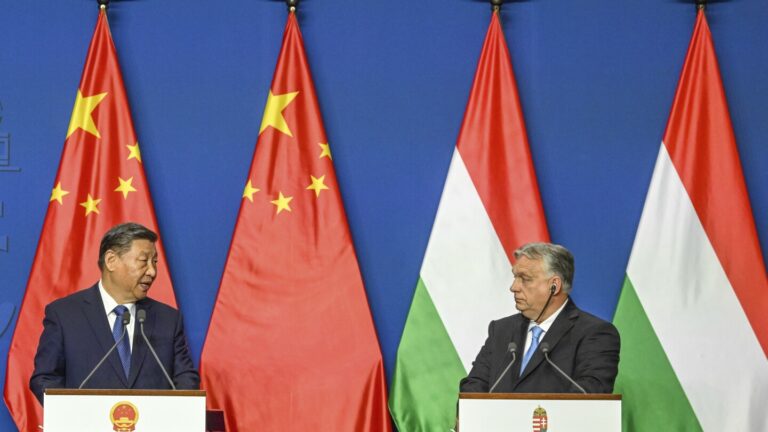BUDAPEST, Hungary (AP) – Hungary and China signed a number of new agreements Thursday to deepen economic and cultural cooperation during Chinese President Xi Jinping’s visit to the Central European nation. The visit is aimed at solidifying China’s economic footprint in the region. .
Mr Xi and Hungarian Prime Minister Viktor Orbán met in the capital Budapest as part of the last stop of the Chinese leader’s five-day European tour. Serbia and France. At a press conference after the meeting, Orbán praised the “ongoing and unbroken friendship” between the two countries since he took office in 2010, and vowed that Hungary would continue to welcome investment from China. did.
“I urge the President that Hungary will continue to provide fair conditions for Chinese companies investing in our country, and that we will create opportunities for cutting-edge Western and cutting-edge Eastern technologies to meet in Hungary and build cooperative relationships. I want to guarantee that we will,” Orbán said.
Beijing has invested billions of dollars in Hungary and sees the European Union member state as an important stepping stone within the 27-nation trading bloc. In December, Hungary announced that China’s BYD, one of the world’s largest EV manufacturers, would open a factory there. Europe’s first EV production factory In the country’s south, it’s an expansion that could upend the competitiveness of the continent’s auto industry.
Hungary has also hosted several Chinese EV battery factories and hopes to become a global hub for lithium-ion battery manufacturing, with Hungarian and Chinese-controlled Piraeus as part of Xi’s Belt and Road Initiative. A railway project connecting the ports is underway. Greece is the gateway for Chinese products to Central and Eastern Europe.
On Thursday, Mr. Xi agreed with Mr. Orbán that the Belt and Road Initiative is “very much in line with Hungary’s East Opening Strategy,” and said that China is encouraging Hungary to play a greater role within the EU in promoting China-EU relations. said he supports it.
Hungarian and Chinese officials signed a strategic partnership agreement and 18 other agreements and memoranda of understanding, but no major investments were announced at the press conference.
However, Hungarian Foreign Minister Péter Szijjarto later said in a Facebook video that initial talks had begun on China’s development of a Budapest freight rail bypass and rail link between the capital and Budapest Ferihegy Airport.
Mr. Orbán is a nationalist populist leader. pursued a deeper relationship with China While distancing himself from more mainstream partners within the EU, he spoke at a press conference about China’s role in changing the global balance of power, pointing out that three-quarters of investments in Hungary last year came from China. Told.
“If you look back at the world economy and commerce 20 years ago, it bears no resemblance to the situation we live in today,” Orbán said. “Back then, we lived in a unipolar world, but now we live in a multipolar world order. One of the main pillars of this new world order is China.”
He added that Hungary aims to extend economic cooperation with China to the nuclear field as well. Hungary is currently working with Russia to add a new reactor to the Paks nuclear facility, which is expected to be operational by the end of 2010.
During Xi’s visit, Budapest residents faced road blockades and increased security as groups of Budapest supporters and critics gathered and demonstrated across the city.
Hundreds of people gathered near Budapest’s Buda Castle to catch a glimpse of Xi’s motorcade, waving Chinese and Hungarian flags. Many Chinese people in attendance wore red baseball caps and claimed to be volunteers from the Chinese embassy.
A Hungarian lawmaker from the opposition Momentum party told The Associated Press that he and a colleague were approached by a group of such men as they tried to plant an EU flag on a bridge in Budapest on Wednesday.
In a video obtained by The Associated Press, Congressman Marton Tompos shows men, all wearing red baseball caps, trying to prevent flags and symbols referencing Chinese-claimed Tibet and Taiwan from being flown along Xi’s route. He said he confronted him to confirm. convoy.
“They said they were volunteers from the Chinese embassy here, and they wanted to make sure there were no Tibetan or Taiwanese flags, because that’s not good,” Tompos said. He added that the men did not let his colleague proceed “until they showed that it was an EU flag.”
During the day, other small clashes occurred between Tibetan protesters and some Chinese in red hats, who accused activists of hiding Tibet’s national flag with their own national flag. They tried to prevent the flag from being raised.
One of the activists, Tenzin Yanzom, campaign coordinator for the International Tibet Network, criticized the Hungarian government for “allowing Chinese police to operate on the streets of Hungary.”
“This is not China, right? This is Hungary, a free country, and we have freedom of speech,” she said.

